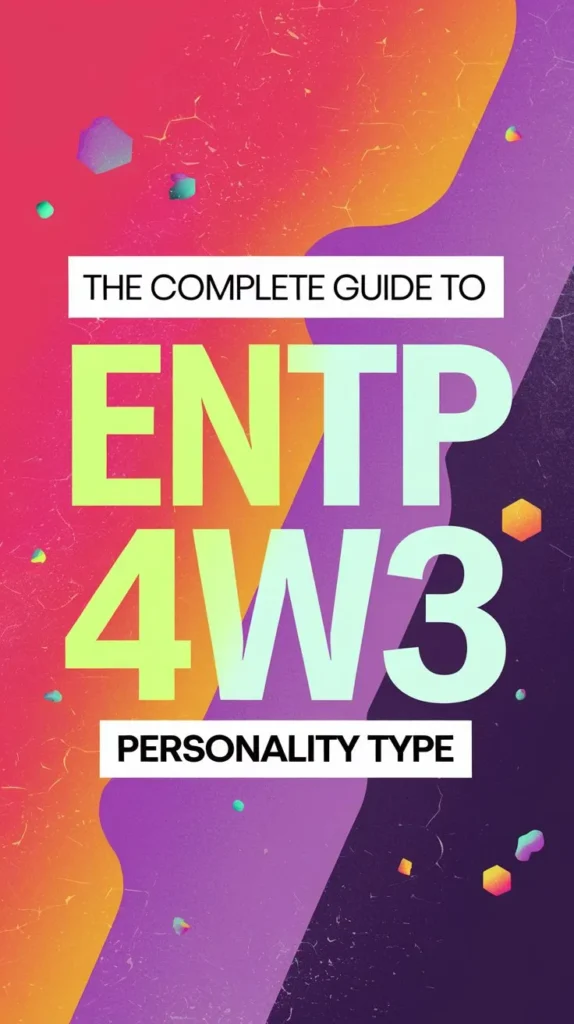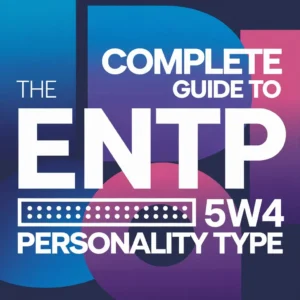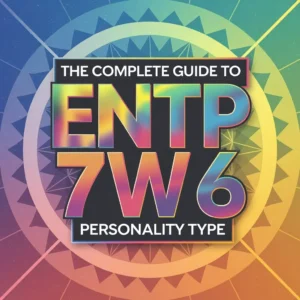As an ENTP 4w3, you’re likely no stranger to the thrill of exploring new ideas and pushing boundaries. But have you ever stopped to think about what drives your creative spark, or why you sometimes struggle with self-doubt and anxiety?
By exploring the intricacies of your personality type, you’ll discover how to harness your strengths, overcome your weaknesses, and build authentic connections with others.
You’ll learn how to quiet your inner critic, tap into your innovative potential, and create a life that truly reflects your values and passions. But first, you need to understand what makes you tick…
In a Nutshell

- ENTP 4w3 individuals possess a unique blend of charisma, logic, and creativity, making them innovative thinkers and charismatic leaders.
- They face inner demons, such as self-doubt and anxiety, which can lead to emotional turbulence and mood swings.
- ENTP 4w3 individuals are well-suited for careers in creative startups, product development, and social entrepreneurship, where autonomy and freedom are essential.
- They navigate romantic relationships with intellectual curiosity and emotional intensity, seeking partners who can engage them on both cognitive and emotional levels.
Understanding ENTP 4w3 Personality Traits
When exploring the ENTP 4w3 personality type, you’ll likely encounter individuals who embody a unique blend of charisma, logic, and creativity, making them both intriguing and complex characters.
As you excavate deeper, you’ll discover that ENTP motivations are deeply rooted in their desire for self-expression and autonomy. They’re naturally drawn to exploring new ideas and possibilities, often taking unconventional approaches to solve problems.
This innate curiosity fuels their passion for learning and growth.
In their pursuit of 4w3 self discovery, ENTPs are constantly seeking to understand themselves and the world around them.
They’re driven to uncover hidden patterns and connections, often finding innovative solutions to complex issues.
This introspective nature allows them to develop a profound understanding of their own strengths, weaknesses, and values.
As a result, ENTPs are often charismatic leaders, inspiring others with their vision and enthusiasm.
Strengths and Weaknesses of ENTP 4w3
As you explore into the strengths and weaknesses of ENTP 4w3 individuals, you’ll find that their innovative thinking and adaptability enable them to thrive in dynamic environments.
This rapid adaptability allows them to adjust to new situations and challenges with ease, making them highly resilient.
Their innovative thinking enables them to come up with creative solutions to complex problems, making them valuable assets in brainstorming sessions and strategic planning.
You’ll also notice that ENTP 4w3 individuals are naturally curious, always seeking to learn and explore new ideas and perspectives.
This curiosity drives them to continuously improve and refine their skills, making them highly competent in their chosen fields.
However, their tendency to be overly critical and perfectionistic can sometimes hold them back from taking action.
You may struggle with procrastination and indecision, especially when faced with multiple options or uncertain outcomes.
Additionally, your tendency to focus on the big picture can lead to neglect of details, resulting in careless mistakes.
Emotional Challenges and Intensity
You face a unique set of emotional challenges due to the dynamic interplay between your ENTP and 4w3 personality traits, which can sometimes create an intense inner world. Your introspective nature as a 4w3 can amplify the emotional turbulence inherent in ENTPs, making it difficult to navigate your feelings.
Some common emotional challenges you may experience include:
- Inner Demons: Your 4w3 trait can manifest as self-doubt, anxiety, and fear of failure, which can hold you back from pursuing your goals and desires.
- Emotional Turbulence: Your ENTP nature can lead to rapid mood swings, making it hard to maintain emotional stability and consistency.
- Overthinking: Your analytical mind can lead to excessive rumination, causing emotional distress and mental fatigue.
- Fear of Vulnerability: Your 4w3 trait can make you hesitant to open up and show vulnerability, fearing rejection or judgment from others.
Recognizing these emotional challenges is the first step towards developing strategies to manage them and cultivate emotional resilience. By acknowledging and working through these issues, you can break free from the constraints of your inner world and tap into your full potential.
Career Paths and Entrepreneurial Ventures
Your unique blend of ENTP creativity and 4w3 introspection can fuel innovative career paths and entrepreneurial ventures that align with your values and passions.
As an ENTP 4w3, you’re naturally drawn to unconventional ideas and approaches, making you a perfect fit for creative startups and innovative ventures. Your introspective nature helps you identify areas that need improvement, and your ENTP enthusiasm drives you to find novel solutions.
You’re well-suited for careers that involve brainstorming, problem-solving, and pushing boundaries.
You might excel in roles like product development, design thinking, or social entrepreneurship, where you can harness your creativity to drive positive change.
Alternatively, you could create your own innovative ventures, leveraging your 4w3 introspection to understand market needs and your ENTP creativity to craft unique solutions.
Whatever path you choose, remember to prioritize autonomy and freedom, as these are essential for your growth and fulfillment.
Romantic Relationships and Compatibility
As an ENTP 4w3, you often navigate romantic relationships with a mix of intellectual curiosity and emotional intensity, seeking partners who can engage you on both cognitive and emotional levels.
You crave a deep connection with your partner, but your fear of intimacy can create struggles in your relationships. You may find yourself drawn to individuals who are confident, charismatic, and passionate, as they can help bring out your own emotional depths.
Some key aspects to ponder in your romantic relationships:
Power dynamics: You may struggle with surrendering control in your relationships, leading to power struggles with your partner.
Intimacy struggles: Your fear of emotional vulnerability can make it challenging to form close, intimate connections with your partner.
Emotional intensity: Your intense emotional nature can create a passionate and exciting relationship, but also lead to conflicts and drama.
Intellectual stimulation: You need a partner who can engage you in intellectual discussions and debates to keep you interested and stimulated.
Independence: You value your independence and autonomy in relationships, which can sometimes lead to conflicts with your partner.
Building Authentic Connections With Others
As an ENTP 4w3, you’re naturally drawn to intellectual sparring and exploring new ideas.
However, building authentic connections with others requires a different approach.
You’ll need to create space for vulnerable moments, foster mutual respect, and cultivate deeper conversations that go beyond surface-level debates.
Embracing Vulnerable Moments
Embracing vulnerable moments allows ENTP 4w3 individuals to shed their tendency to intellectualize emotions, thereby creating an opportunity to build authentic connections with others.
By doing so, you can break free from the constraints of your analytical mind and tap into your emotional authenticity. This can be a liberating experience, as you begin to understand that vulnerability is a strength, not a weakness.
To cultivate emotional authenticity, try the following vulnerability exercises:
Practice self-reflection: Set aside time to introspect and acknowledge your emotions, rather than rationalizing them away.
Share your fears: Open up to a trusted friend or partner about your deepest fears and anxieties.
Show empathy: Engage in active listening and acknowledge the emotions of others, rather than offering solutions.
Admit uncertainty: Be comfortable saying ‘I don’t know’ and embracing the unknown.
Celebrate imperfections: Recognize that nobody is perfect, and that imperfections are a natural part of the human experience.
Fostering Mutual Respect
By cultivating emotional authenticity through vulnerability, you create a foundation for building authentic connections with others, which is rooted in mutual respect.
When you’re willing to be open and honest about your thoughts and feelings, you invite others to do the same. This reciprocity fosters an environment of trust, where individuals feel comfortable sharing their own perspectives and emotions.
To maintain this harmony, setting boundaries is vital. This means communicating your limits and expectations clearly, ensuring that both parties are on the same page.
Attentive listening is also pivotal, as it allows you to fully understand the other person’s needs and concerns. By giving them your undivided attention, you demonstrate that you value and respect their thoughts and opinions.
As you navigate these interactions, remember that mutual respect is a two-way street. Be willing to compromise and adapt to the needs of others, just as you expect them to do for you.
Cultivating Deeper Conversations
To build authentic connections with others, you must plunge beyond surface-level conversations and actively seek out opportunities to explore topics that spark genuine interest and passion. This requires intentional effort and a willingness to listen actively and ask open-ended questions that encourage meaningful sharing.
Practice active listening: Give your undivided attention to the speaker, and avoid interrupting or mentally preparing your response while they’re speaking.
Ask open-ended questions: Encourage the other person to share their thoughts and feelings by asking questions that can’t be answered with a simple ‘yes’ or ‘no’.
Seek common ground: Find areas of shared interest or passion to create a sense of connection and rapport.
Be vulnerable: Share your own thoughts, feelings, and experiences to create a safe space for others to do the same.
Avoid giving unsolicited advice: Refrain from offering solutions unless explicitly asked for, and instead focus on understanding the other person’s perspective.
Overcoming Self-Doubt and Insecurity
As an ENTP 4w3, you’re likely no stranger to self-doubt and insecurity, which can hinder your growth and potential.
To overcome these obstacles, possessing a strong sense of self-assurance is vital to focus on building your inner confidence and silencing that critical inner voice that often holds you back.
Building Inner Confidence
Your self-doubt and insecurity often stem from a tendency to overthink and intellectualize your emotions, making it essential to develop a more compassionate and realistic inner dialogue. This can be achieved by practicing self-reflection exercises that help you identify and challenge your negative thought patterns.
By doing so, you’ll become more aware of your strengths and weaknesses, allowing you to focus on your positive qualities and accomplishments.
Mindful affirmations: Repeat positive affirmations to yourself daily, focusing on your strengths and accomplishments. This will help you rewire your brain to think more positively and confidently.
Self-reflection exercises: Schedule regular time for self-reflection, journaling, or meditation to identify and challenge your negative thought patterns.
Celebrate small wins: Acknowledge and celebrate your daily achievements, no matter how small they may seem.
Surround yourself with positivity: Spend time with people who uplift and support you, and avoid those who bring you down.
Practice self-compassion: Treat yourself with kindness and understanding, just as you’d a close friend.
Silencing Critical Inner Voice
How do you typically respond to your inner critic, and what would happen if you could silence its constant barrage of self-doubt and insecurity?
As an ENTP 4w3, you’re likely no stranger to the negative self-talk that can hold you back from realizing your full potential.
But what if you could break free from this cycle of self-doubt and cultivate a more compassionate relationship with yourself?
One effective way to silence your critical inner voice is to practice self-compassion.
This involves treating yourself with kindness, understanding, and acceptance, rather than judgment and criticism.
By acknowledging that your thoughts and feelings are valid, you can begin to quiet the Inner Critic and develop a more positive self-image.
Inner peace techniques such as meditation, deep breathing, and mindfulness can also help you stay present and focused, rather than getting caught up in negative thought patterns.
Personal Growth Strategies for ENTP 4w3
You can accelerate your personal growth by recognizing the patterns of self-sabotage that often stem from your 4w3’s tendency to overthink and idealize.
This self-awareness is vital in breaking free from the cycle of self-doubt and indecision that can hold you back.
To achieve this, cultivate ENTP mindfulness by being present in the moment and acknowledging your thoughts without judgment.
This allows you to identify areas where you’re overthinking and idealizing, and take corrective action.
Practice self-compassion: Treat yourself with kindness and understanding, just as you’d a close friend.
Set realistic goals: Break down lofty ideals into achievable, bite-sized objectives to build momentum and confidence.
Embrace imperfection: Recognize that nobody is perfect, and that it’s okay to make mistakes – they’re an essential part of growth.
Develop a growth mindset: Focus on learning and progress, rather than perfection and achievement.
Surround yourself with positive influences: Seek out people and resources that support and encourage your personal growth.
Frequently Asked Questions
Can ENTP 4w3 Individuals Be Successful in Traditional 9-To-5 Jobs?
You can thrive in traditional 9-to-5 jobs, but it’s vital to find roles that offer autonomy and innovation, or you’ll stagnate. Climbing the corporate ladder might not equal career fulfillment, so prioritize roles that spark your curiosity and creativity.
How Do ENTP 4w3 Personalities Handle Authority and Criticism?
You naturally operate with a rebel mindset, often questioning authority figures and pushing boundaries, which can lead to friction; however, you’ll thrive when you learn to balance your independence with constructive criticism and adapt to authority’s guidance.
Are ENTP 4w3 Individuals More Prone to Mental Health Issues?
You may be more susceptible to mental health issues due to your tendency to internalize criticism and authority, fueling anxiety triggers. Breaking free from mental health stigma, you can acknowledge your struggles and seek help to overcome them.
Can ENTP 4w3 Personalities Be Good Parents and Caregivers?
As a parent, you’ll bring a unique approach to parenting styles, often encouraging independence and intellectual exploration. However, your adaptability and spontaneity may create unpredictable family dynamics, requiring intentional effort to establish stability and consistency.
Do ENTP 4w3 Individuals Have a Harder Time Making Lifelong Friends?
You might find it challenging to form lifelong friendships due to your tendency to prioritize intellectual stimulation over emotional intimacy, making it difficult to establish and maintain deep social connections that last a lifetime.










James Green is a seasoned psychologist specializing in narcissism and other personality and relationship issues. With a passion for helping others understand and navigate their own personality traits and relationships, James shares his insights and expertise on his blog, Personality Diaries. Connect with him on Pinterest and Instagram for regular updates and insights.













